Swiss urge moderation from Iranian leaders
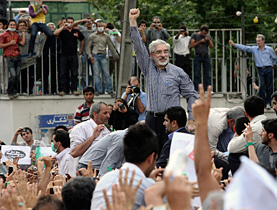
Following the deaths of eight Iranians in street protests, Switzerland has called on the country's authorities to deal with such demonstrations with restraint.
On Tuesday Iran’s top legislative body ruled out annulling a disputed presidential poll that has prompted the biggest street protests since the 1979 Islamic revolution, but said it was prepared for a partial recount.
In what appeared to be a first concession by authorities to the protest movement, the 12-man Guardian Council said it was ready to re-tally votes in the poll, in which hardline President Mahmoud Ahmadinejad was declared the runaway winner.
The Swiss foreign ministry said in a statement that press freedom and freedom of expression must be maintained, adding that it hoped the re-counting would be carried out “with the necessary diligence required by such an important issue for the Iranian people”.
Nevertheless the powerful Guardian Council – a group of clerics and Islamic law experts – rejected reformist calls to annul Friday’s election. The election triggered political turmoil, focusing global attention on the world’s fifth-biggest oil exporter.
Iran’s state radio said seven people were killed in Monday’s clashes – the first official confirmation of deaths linked to the street battles following the disputed election.
On Tuesday Ahmadinejad’s supporters appeared to have denied the opposition the chance to keep up the momentum by mobilising thousands of demonstrators in central Tehran where supporters of reformist challenger Mir Hossein Mousavi’s had planned to gather again.
Later however thousands of Mousavi’s supporters marched in Tehran – largely in silence, without the accustomed anti-Ahmadinejad chants – towards the state television building.
Illustrating Iran’s sensitivity to world opinion, authorities on Tuesday banned foreign journalists from leaving their offices to cover street protests.
“Coup d’état”
In Washington, President Barack Obama said the disputed election revealed a change in expectations among voters and perhaps their leaders, but he stopped short of saying the balloting was rigged.
Jamshid Anvar, a former United Nations official who has lived outside Iran for 51 years, was more categorical.
“From all the peripheral information we have received, there is no doubt for me that the election was rigged,” he told swissinfo.ch.
“In my view – and that of many other people – it’s a coup d’état. It’s a clear provocation. [Ahmadinejad and his followers] have the means, the weapons, the audacity and ruthlessness of attacking peaceful demonstrators, beating them up and subjugating them.”
Anvar, who demonstrated on his own outside the UN in Geneva on Monday, considered it “not impossible” that even Supreme Leader Ayatollah Ali Khamenei could be a hostage in the hands of Ahmadinejad and the Revolutionary Guards.
If this were the case, he thinks Khamenei would have enough leverage to bring about a “Kenya-like” compromise, with Ahmadinejad remaining president and Mousavi becoming foreign minister.
“This is the most peaceful solution possible, but also the least likely. The most likely is bloodshed.”
Peaceful resolution?
Farhad Tavakoli, a managing director at Samco Capital investment bank in Geneva, agreed that the result of the election “just doesn’t seem right”.
“If you look at it economically – the high number of unemployed, inflation rate of 25 per cent per annum – there is general discontent in the country. The expectation was that Ahmadinejad wasn’t very popular and wasn’t going to be re-elected,” the Iranian expatriate told swissinfo.ch.
Tavakoli says the people of Iran don’t want trouble. “They just want change, more freedom and for the economy and international relations to get better. If they were given those things, they would be happy.”
As for a peaceful resolution, he says it depends how far people want to push things. “If they want to see a change in the presidency, there might be solutions for that. But if they push for more substantial change – I don’t know,” he said.
“The world needs to know that the image of Iran portrayed is not the real image. The real people of Iran want peace, to be friendly and to get on with life.”
swissinfo.ch and agencies (with input from Simon Bradley)
Since Iran’s disputed presidential election on June 12, supporters of defeated moderate candidate Mir Hossein Mousavi have been taking to the streets, clashing with police.
The scale of Ahmadinejad’s first-round victory – he won 63 per cent of the vote to Mousavi’s 34 per cent – surprised many Iranians, who widely predicted Mousavi would win. A few days ahead of the vote, opinion polls reinforced the view of pundits and diplomats that Mousavi was seeing a surge in support that could win him the election, possibly in a second-round run-off.
Many Iranian men and women have protested against the result, and the political unrest has been the most serious in Iran since the 1979 Islamic revolution.
Because of its neutrality, Switzerland has over the years represented the interests of a number of countries in Iran. Since 1980 it has represented US interests there and looks after Iranian interests in the US.
Swiss President Hans-Rudolf Merz met Mahmoud Ahmadinejad in Geneva on April 19, 2009.
Ahmadinejad has suggested the Holocaust never happened and has allegedly called for Israel’s destruction. Israel’s ambassador to Bern was briefly recalled after the Merz meeting.
The two heads of state met to discuss bilateral ties, ahead of the United Nations racism conference in Geneva where the Iranian president gave a controversial speech the following day, sparking a walkout.
Iran is one of Switzerland’s most important trading partners in the Middle East. A trade agreement was signed in 2005 but has not yet been ratified.
There were 183 Swiss expatriates based in Iran in 2007.

In compliance with the JTI standards
More: SWI swissinfo.ch certified by the Journalism Trust Initiative

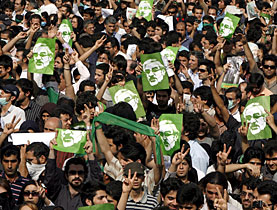
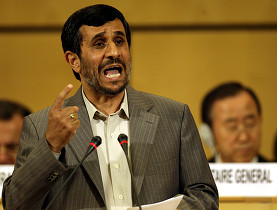
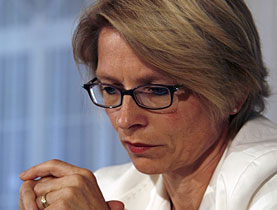
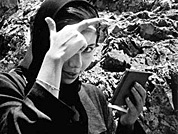
You can find an overview of ongoing debates with our journalists here . Please join us!
If you want to start a conversation about a topic raised in this article or want to report factual errors, email us at english@swissinfo.ch.